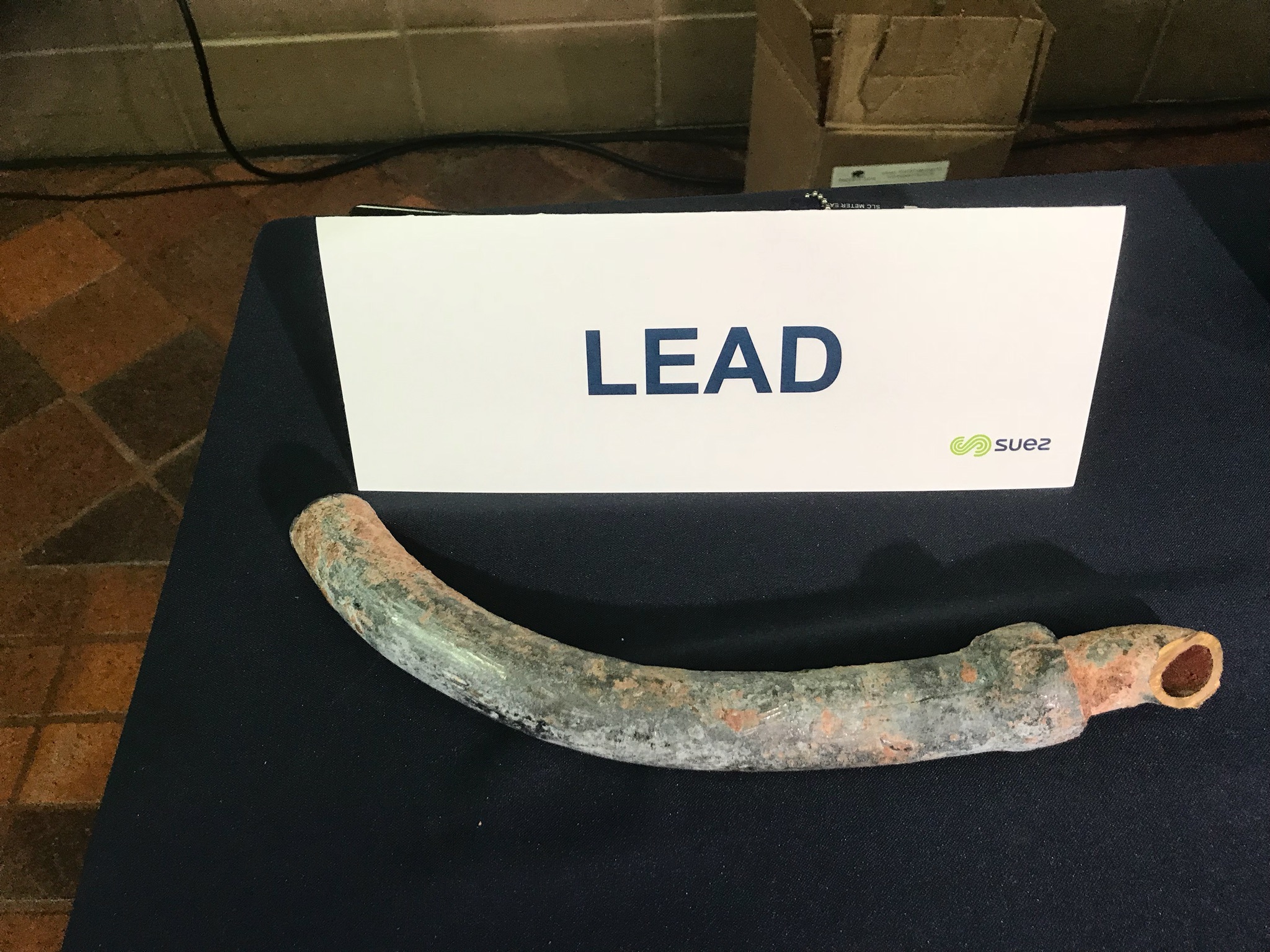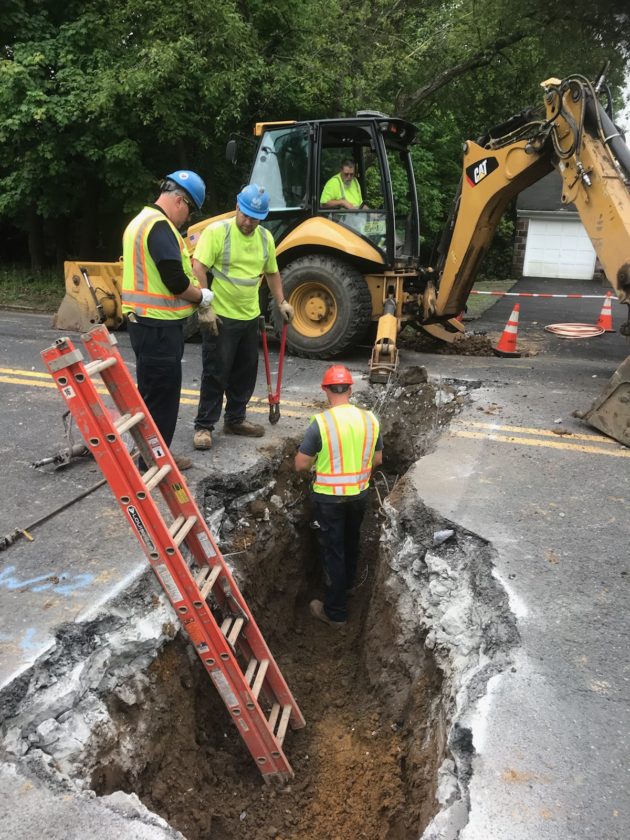
HACKENSACK, N.J.—A proposal to replace customer lead service lines for a flat fee of $1,000—and impose a surcharge of up to 85 cents per month on water bills for 200,000 customers in Bergen and Hudson counties—will be open for public comment at a hearing on Tuesday, Jan. 21 at 4:30 p.m. and 5:30 p.m. in the Bergen County Board of Chosen Freeholders Meeting Room in Hackensack.
The state Office of Administrative Law (OAL) is conducting the hearing, which will be overseen by Judge Jacob S. Gertsman.
“The company is requesting approval of a monthly surcharge up to $0.85 per month to General Metered Water customers, which includes the costs of the program and the company’s costs incurred above the $1,000 per residence payment as part of the total,” states the public notice.
The company notes it will initially pay the difference above $1,000 to replace a customer’s lead service line and seek reimbursement later via a monthly surcharge on all customers.
The Suez petition to begin a two-year pilot program was transferred last year by the state Board of Public Utilities to the OAL for a decision and recommendation back to BPU.
Public advocate opposed
Suez’s proposal is opposed by the state Division of Rate Counsel—an advocate for statewide utility customers—on the basis that Suez, a private utility, cannot do work on private property and charge all ratepayers. They note “well established state law” prevents such private utility work.
In addition, Rate Counsel contends that Suez’s proposal to do such work and make a profit is not only illegal but sets a bad precedent for future utilities doing work on private property in the state.
Also, said Rate Counsel officials, Suez did not specify the costs or extent of the customer program.
Agency officials said they would be filing a motion soon to request Gertsman issue a decision on issues of law relating to the Suez proposal before proceeding with a final recommendation to BPU.
The maximum 85 cent monthly surcharge, if applied to all customers, would bring in $170,000 monthly, or a little over $2 million per year to Suez.
Suez officials did not respond to questions about the proposed surcharge.
Initially, company officials did not disclose possible surcharge rates in the original proposal to the state Board of Public Utilities made in March 2019.

Only public hearing
The Jan. 21 hearing is likely to be the only opportunity for Suez customers in the Pascack and Northern valleys to offer views on the proposal.
Suez customers may submit written comments via U.S. mail to Judge Gertsman, Office of Administrative Law, P.O. Box 49, Trenton, NJ, 08625-0049.
To view Suez’s customer replacement proposal, copies were sent to town clerks in Suez service areas, according to the public notice published Dec. 30, and may be accessed via www.mysuezwater.com.
Here’s a direct link to Suez’s petition to the state BPU to begin a pilot program: bit.ly/suezrates.
Suez Water, a privately-owned global water utility, proposed to remove up to 2,400 utility-owned lead service lines in early 2019 to help reduce possible lead corrosion into water supplies. It also applied in March to begin a pilot program to replace customer lead service lines.
The global company publicly reported a $380 million profit in 2018.
Suez’s plan is to charge customers a flat $1,000 replacement fee, which could be paid off over one year, and charge any extra cost to all customers via a surcharge on monthly bills.
The utility estimated that an average lead line replacement costs between $3,000 to $8,000. No estimates of total homes or businesses needing such work are included in the proposal, stressed Rate Counsel officials.
Late in 2019, Gov. Phil Murphy proposed a possible $500 million statewide bond issue most likely for grants and subsidies to public utilities doing lead line replacements.
No legislation has yet been introduced in 2020, although it was unclear if such funds could be accessed by a private utility such as Suez.
No surcharges
Stefanie Brand, director, Rate Counsel division, noted Suez is a for-profit private utility company as opposed to public water utilities and needs to find ways to fund its customer lead line replacements that don’t involve charging all its ratepayers, plus making a profit on the service to boot.
“We do need to resolve the lead in water issue but Suez needs to find another way to do that than charging all its ratepayers,” Brand told Northern Valley Press Jan. 7.
She said charging all customers for private lead line replacements is illegal, plus “fundamentally unfair” to customers who have already replaced lead lines at their own expense.
Moreover, Brand said it’s likely many customers with lead lines may not want Suez on their property and an additional surcharge for such work can harm customers not capable of paying.
Despite several meetings with utility officials over months, Brand said no resolution to issues of case law or financing could be worked out.
Although it is not Rate Counsel’s role to offer financing alternatives, said Brand, she said rather than a surcharge, other options could include the utility offering low- or no-interest loans on the entire replacement cost, a state-created fund to assist property owners to fund replacements, or a state tax to help fund statewide replacements.
‘A better handle’
“Suez should have a better handle on how many customer-side and company-side lead service lines exist in their system,” said Brand, noting the utility offered no such estimates.
Brand said based on meetings with utility officials, she believed Suez officials did not understand “the scope of the problem” and were more interested in generating profit by surcharging ratepayers than offering replacement options to customers.
Recent water sampling results from 141 homes with lead pipes over the last six months in 2019 revealed average readings at 11.2 parts per billion, below the 15 PPB federal lead standard. However, three homes were over the federal standard.
The state Department of Environmental Protection requires a water utility to notify customers and take corrective actions when lead levels exceed 15 parts per billion in 10 percent of samples.
Water utilities are required by NJDEP to sample 100 or more homes with lead lines twice a year to monitor lead levels.
In addition, according to a press statement, Suez reported it had removed 2,517 of its lead service lines in 2019, costing approximately $22 million, to help reduce lead levels.
Suez also adjusted its pH levels and anti-corrosion chemicals in 2019 to help reduce lead leaching into water from lead pipes, company officials said.
Suez assures customers that there is no lead in water leaving its Haworth treatment plant.
